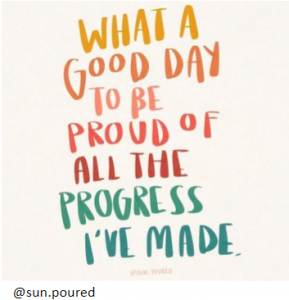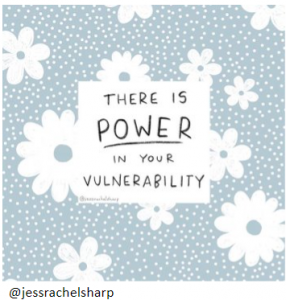Many of us are aware that we’re our own worst critic when it comes to how we view ourselves. We’re constantly looking at ourselves through a critical lens with the belief that it determines our value and worth as a person, and that can be exhausting! The constant high expectations, pressure, and harsh criticism can chip away at our confidence and self-worth over time.
We may not always realize that we hold ourselves up to impossibly high standards but wonder why we’re always overworked, fully booked and busy, or stressed and anxious. Perfectionism as a problem is a difficult concept to wrap our minds around because we’re primed to expect nothing less if perfection can be achieved and to strive for improvement until we reach it.
When we expect nothing short of perfection, we have already set ourselves up for failure.
Perfection can seep into every aspect of our lives if we’re not mindful, whether it’s our careers, academics, relationships, or hobbies. During a pandemic, we might find ourselves extending a helping hand to everyone else even when we’re running low on energy with the belief that we wouldn’t be a good friend or helpful family member otherwise. We might force ourselves to be highly productive even when the world around us is unstable. A hobby isn’t worth doing unless we’re the best of the best. Competing for the top grade or most coveted position at our company is a must if we’re going to be taken seriously and seen as competent. If we fall short in any way, we criticize ourselves instead of seeing the progress made. If this sounds at all familiar, we must ask ourselves if perfection can be achieved in the first place. If so, at what cost?
Perfectionism can manifest in different ways, including expecting nothing but flawlessness, a drive to avoid failure or criticism, unrealistic expectations, harsh self-judgment, or all the above. Instead of seeing perfectionism and the pressure that it can present as a problem, many see impossible standards and a constant drive to do better as a healthy and sustainable way of reaching their definition of success. The problem is that the results from our efforts almost never measure up to what our perfectionistic tendencies call for, and that results in a sense of failure or low self-esteem. Even if the results tick every box, it’s unlikely that we will feel satisfied or celebratory for long before quickly moving on to the next challenge or still finding flaws and areas of improvement. It’s no wonder that many of us feel pressured and anxious about our performance and goals!
When we expect nothing short of perfection, we have already set ourselves up for failure. This is an important point, so I’m going to say it again. When we expect nothing short of perfection, we have already set ourselves up for failure. When we don’t allow room for error or growth, we set a bar that’s impossible to reach and trains us to be dissatisfied with our progress no matter how far we’ve come. Now, what can we do to flip the script and loosen the grip that perfectionism has on us? Here are some ways to get comfortable with balancing that critical voice in our heads with a more compassionate one.

Ask for Help
When we expect perfection, it’s hard to allow ourselves to ask for help from anyone else. We want to be in control and have the job done right. In other words, we have a difficult time stepping back and letting others take care of our needs or dismiss anyone offering a helping hand. We might see asking for help as a sign of weakness or incompetence even if that’s not the case.
Asking for help can be a way to collaborate with others and broaden our horizons when it comes to getting things done. When we allow others to step in with an act of service, it grants them a feeling of value and satisfaction. Think about a time recently when you were able to help somebody out, however small the difference. Wasn’t it a great feeling to be of use to somebody who needed a helping hand? Now let somebody else do the same for you. Our time and energy are limited resources and by allowing others to pitch in for smaller tasks, it gives us a chance to focus on our own priorities.
Small Steps Still Lead to Results
Even if we haven’t reached a goal yet, every step that leads us a little closer is worth noting and celebrating. It’s easy to brush off small changes and progress but giving yourself credit for making a conscious effort is a great way to feel more confident and capable. If we practice achieving smaller goals and celebrating them, it’s much easier for us to feel a sense of accomplishment and self-efficacy. Self-efficacy is our belief in our own abilities when it comes to accomplishing a certain task or reaching a specific goal. If we practice seeing small wins as worthwhile, we can build our courage when it comes to bigger goals down the line. Giving yourself credit for a small step is a great way to give yourself some much-needed encouragement!
Plan for the Unexpected
It’s not uncommon for those of us who have high standards to be constantly planning, preparing, and revising in order to feel comfortable. We believe that if we plan and prepare enough then we can avoid anything ever going wrong or falling short. Try to get comfortable with uncertainty and the possibility of plans not working out the way you expected. It’s easy to focus on the negative aspects of our plans falling through the cracks and fail to see how our setbacks and hurdles have strengthened us.
When we have a setback, we’re able to reassess how we can improve next time around. Think back to a time when things didn’t work out the way you expected but ended up being even better than you could have planned. Wasn’t it a wonderful surprise? One trick that I use when facing a setback is to tell myself that it’s simply a delay and not my destination. When we open ourselves up to opportunities and the unexpected, we give ourselves the chance to experience life and all its wonderful surprises in full.
See Vulnerability as a Strength
Demanding great results and perfection is enough to wear anyone down, though we often fail to remind ourselves that mistakes are a part of life. Being vulnerable and admitting that we don’t have all the answers, fear rejection and failure, or simply need some help, can be a great relief. When we are vulnerable to others and admit that we are imperfect, we can build an honest connection with them while showing ourselves compassion.

By revealing to ourselves and others that we are not perfect, we take away the pressure and expectation to be so. When we act as though we have it all under control, our best traits are put on display for others and our insecurities, fears, and vulnerabilities are locked down in the basement where nobody can ever access them. We do ourselves a great disservice by masking our true selves. Remind yourself that you are only human and it’s perfectly okay to admit that you have your own vulnerabilities too! We don’t expect our friends, family, or partner to be strong every waking moment because we understand that they are human beings with their own struggles, weaknesses, and emotions.
By revealing to ourselves and others that we are not perfect, we take away the pressure and expectation to be so.
Being vulnerable allows for others to bond with us on a deeper level and feel comfortable being vulnerable as well. We can share our struggles together as human beings and bond over them. It’s a wonderful way to highlight our experiences and give others permission to be their authentic selves in front of us. By gently reminding ourselves that we are human beings with our own boundaries and limits, we can start to have a healthier relationship with ourselves and others.
What You and Your Car Have in Common
A mentor of mine once shared a great example of how pushing ourselves beyond our limitations is the same thing as having a car running on empty. Our cars take us places and keep us safe and warm as we travel to where we need to go. We understand that we need to keep it fueled in order to be running properly. When the tank is running low, we go to the gas station and fill it up.
When it comes to our bodies and minds, we can be running on empty and pushing ourselves past exhaustion and still be wondering why we feel so miserable. We end up tired, irritable, stressed, and anxious because we’ve run out of gas! Instead of refueling ourselves with a simple break, nutritious food, sleep, or exercise, we continue pushing on to the next destination when our tank is empty, and every mile is a struggle. We don’t expect our cars to be in perfect condition when they’re not taken care of, so we shouldn’t expect the same for our minds and bodies. I still use this example as a gentle reminder not to deprive myself of the rest and fuel that I need in order to function at my best. When you’re running on empty, do yourself a favor and go fill your empty tank!

Elvira Chan is our project coordinator at Jessie’s Legacy and advocates for mental health with an interest in eating disorder prevention and awareness. She holds a degree in communications from Simon Fraser University and is currently pursuing a diploma in counselling and human development. During her academic career and work, Elvira’s favorite part has always been about making an authentic impact through her writing and connecting with others. When she isn’t holed up studying or reading, she’s skating at the ice rink, working on her miniature polymer clay models, enjoying a bath bomb from LUSH, or curling up with a spoiled Shih Tzu named Skylar. Her two biggest aspirations for the future involve publishing a novel and going to graduate school for counselling psychology.



